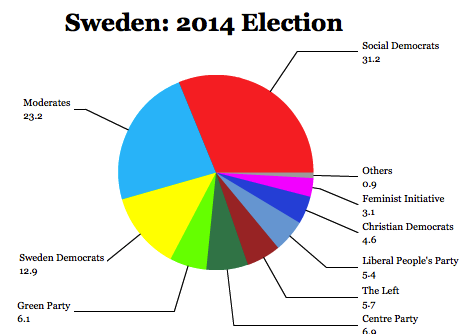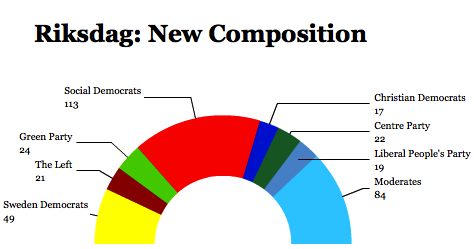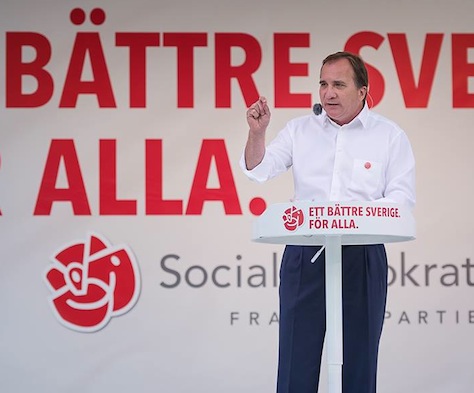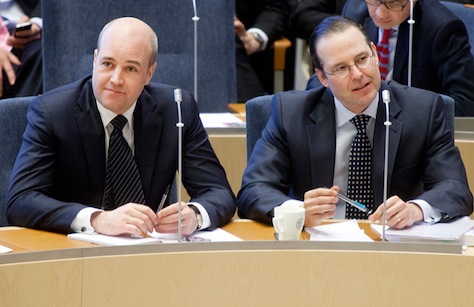Stefan Löfven should have savored Sunday night — as Sweden’s election results came in, his center-left Sveriges socialdemokratiska arbetareparti (Swedish Social Democratic Party) emerged as the top vote-winner by an 8% margin, and Löfven is the overwhelming favorite to become Sweden’s next prime minister.![]()
Monday morning was a different story.
Despite winning the election, the Social Democrats won just 31.2% of the vote, a relatively low total for the party that dominated Swedish government throughout much of the 20th century. In the last two elections, in 2006 and 2010, when outgoing prime minister Frederik Reinfeldt routed the Social Democrats, the party still won 35.0% and 30.7%, respectively.
The last time they won an election, under Göran Persson in 2002, the Social Democrats won 39.9% of the vote. The results from September 14, however, leave Löfven (pictured above) with just 113 seats in the 349-member Riksdag, Sweden’s unicameral parliament.
 If the big loser of the election was Reinfeldt’s center-right Moderata samlingspartiet (Moderate Party), which lost 23 seats, the big winner was the far-right, anti-immigrant Sverigedemokraterna (SD, Sweden Democrats), which gained 29 seats on a platform of limiting Sweden’s generous asylum policy that in 2014 is expected to welcome more than 100,000 refugees to the country, many from war-torn Syria and Iraq. It’s a point of pride for Reinfeldt, presumably, that he spent much of the campaign extolling the compassionate values of his government, even if those costs limited his ability to promise greater welfare spending.
If the big loser of the election was Reinfeldt’s center-right Moderata samlingspartiet (Moderate Party), which lost 23 seats, the big winner was the far-right, anti-immigrant Sverigedemokraterna (SD, Sweden Democrats), which gained 29 seats on a platform of limiting Sweden’s generous asylum policy that in 2014 is expected to welcome more than 100,000 refugees to the country, many from war-torn Syria and Iraq. It’s a point of pride for Reinfeldt, presumably, that he spent much of the campaign extolling the compassionate values of his government, even if those costs limited his ability to promise greater welfare spending.
The rest of Sweden’s parties all made relatively small gains or losses — no other party gained or lost more than five seats in total.
* * * * *
RELATED: Swedish far-right could inadvertently deliver
3rd term to Reinfeldt
RELATED: One month out, Löfven and Social Democrats lead in Sweden
* * * * *
Those dynamics, however, leave Löfven in an unenviable position. Though the Sweden Democrats have clearly made the greatest gains in this election, neither the Reinfeldt-led center-right nor the Löfven center-left are willing to bring the anti-immigrant party into government, despite the efforts of its boyish leader, Jimmie Åkesson, to moderate the party’s harder nationalist (and sometimes neo-nazi and xenophobic) edges. One marvels to wonder his well his party might have done had it not been dogged by scandals that forced eight candidates out of the race after news outlets revealed their racist online commentary.
A hung parliament — and no majority for Sweden’s left
But that’s left the Riksdag without a clear majority. After the 2010 elections, the Moderates and their three allies, which together constitute the Alliansen, formed a minority government with 172 seats. Unofficially, the Swedish Democrats often delivered enough votes for Reinfeldt to fill the three-vote gap that his government needed. Löfven cannot count on the unofficial support of Åkesson’s right-wingers. Moreover, after the stunning results for the Sweden Democrats, there are now 49 seats, not 20, that are politically untouchable.
Löfven’s most natural allies, the Miljöpartiet (Green Party), actually lost a seat, falling to 21 seats. Together, with 134 seats, that leaves the Red-Green coalition 41 seats short of a majority.
Continue reading Swedish election results: Löfven’s dream liberal-left government



